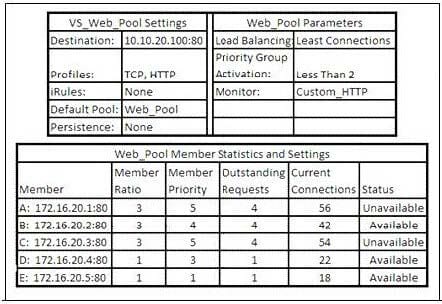Exam Details
Exam Code
:F50-531Exam Name
:BIG-IP v10.x LTM Essentials V10.xCertification
:F5 CertificationsVendor
:F5Total Questions
:99 Q&AsLast Updated
:Jul 15, 2025
F5 F5 Certifications F50-531 Questions & Answers
-
Question 11:
Which action will take place when a failover trigger is detected by the active system?
A. The active device will take the action specified for the failure.
B. The standby device also detects the failure and assumes the active role.
C. The active device will wait for all connections to terminate and then fail-over.
D. The standby device will begin processing virtual servers that have failed, but the active device will continue servicing the functional virtual servers.
-
Question 12:
Assuming that systems are synchronized, which action could take place if the fail-over cable is connected correctly and working properly, but the systems cannot communicate over the network due to external network problems?
A. If network fail-over is enabled, the standby system will assume the active mode.
B. Whether or not network fail-over is enabled, the standby system will stay in standby mode.
C. Whether or not network fail-over is enabled, the standby system will assume the active mode.
D. If network fail-over is enabled, the standby system will go into active mode but only until the network recovers.
-
Question 13:
A virtual server is defined per the charts. The last five client connections were to members C, D, A, B, B. Given the conditions shown in the above graphic, if a client with IP address 205.12.45.52 opens a connection to the virtual server, which member will be used for the connection?

A. 172.16.20.1:80
B. 172.16.20.2:80
C. 172.16.20.3:80
D. 172.16.20.4:80
E. 172.16.20.5:80
-
Question 14:
Which statement is true concerning iRule events?
A. All iRule events relate to HTTP processes.
B. All client traffic has data that could be used to trigger iRule events.
C. All iRule events are appropriate at any point in the client-server communication.
D. If an iRule references an event that doesn't occur during the client's communication, the client's connection will be terminated prematurely.
-
Question 15:
Which three iRule events are likely to be seen in iRules designed to select a pool for load balancing? (Choose 3)
A. CLIENT_DATA
B. SERVER_DATA
C. HTTP_REQUEST
D. HTTP_RESPONSE
E. CLIENT_ACCEPTED
F. SERVER_SELECTED
G. SERVER_CONNECTED
-
Question 16:
Which event is always triggered when a client initially connects to a virtual server configured with an HTTP profile?
A. HTTP_DATA
B. CLIENT_DATA
C. HTTP_REQUEST
D. CLIENT_ACCEPTED
-
Question 17:
A virtual server is listening at 10.10.1.100:80 and has the following iRule associated with it: when HTTP_REQUEST { if {[HTTP::uri] ends_with "txt" } { pool pool1 } elseif {[HTTP::uri] ends_with "php" } { pool pool2 } If a user connects to http://10.10.1.100/foo.html, which pool will receive the request?
A. pool1
B. pool2
C. None. The request will be dropped.
D. Unknown. The pool cannot be determined from the information provided.
-
Question 18:
A virtual server is listening at 10.10.1.100:any and has the following iRule associated with it: when CLIENT_ACCEPTED { if {[TCP::local_port] equals 80 } { pool pool1 } elseif {[TCP::local_port] equals 443 } { pool pool2 } If a user connects to 10.10.1.100 and port 22, which pool will receive the request?
A. pool1
B. pool2
C. None. The request will be dropped.
D. Unknown. The pool cannot be determined from the information provided.
-
Question 19:
Which statement is true about the synchronization process, as performed by the Configuration Utility or by typing b config sync all?
A. The process should always be run from the standby system.
B. The process should always be run from the system with the latest configuration.
C. The two /config/bigip.conf configuration files are synchronized (made identical) each time the process is run.
D. Multiple files, including /config/bigip.conf and /config/bigip_base.conf, are synchronized (made identical) each time the process is run.
-
Question 20:
A virtual server at 10.10.1.100:80 has the rule listed below applied. When HTTP_REQUEST { if {[HTTP::uri] ends_with "htm" } { pool pool1 } elseif {[HTTP::uri] ends_with "xt" } { pool pool2 } If a user connects to http://10.10.1.100/foo.txt which pool will receive the request?
A. pool1
B. pool2
C. None. The request will be dropped.
D. Unknown. The pool cannot be determined from the information provided.
Related Exams:
101
Application Delivery Fundamentals201
TMOS Administration301A
BIG-IP LTM Specialist: Architect, Set up and Deploy301B
BIG-IP Local Traffic Manager (LTM) Specialist: Maintain & Troubleshoot302
BIG-IP DNS Specialist303
BIG-IP ASM Specialist402
F5 Cloud Solutions771-101
Application Delivery FundamentalsF50-506
F5 FirePass 600 V5F50-531
BIG-IP v10.x LTM Essentials V10.x
Tips on How to Prepare for the Exams
Nowadays, the certification exams become more and more important and required by more and more enterprises when applying for a job. But how to prepare for the exam effectively? How to prepare for the exam in a short time with less efforts? How to get a ideal result and how to find the most reliable resources? Here on Vcedump.com, you will find all the answers. Vcedump.com provide not only F5 exam questions, answers and explanations but also complete assistance on your exam preparation and certification application. If you are confused on your F50-531 exam preparations and F5 certification application, do not hesitate to visit our Vcedump.com to find your solutions here.